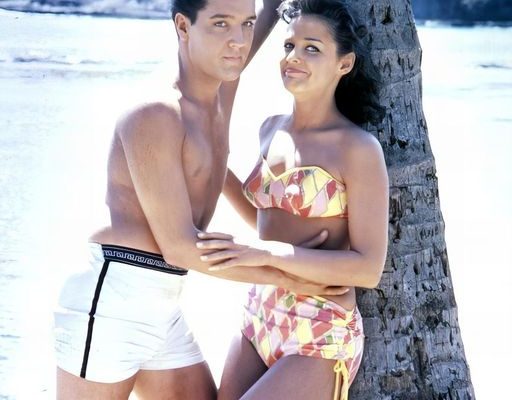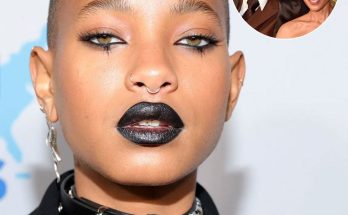This film marked a pivotal moment in Elvis’s Hollywood career. Unlike many of his earlier roles, Elvis’s character, Chad Gates, wasn’t portrayed as a professional singer or performer. Yet, in true Elvis fashion, Chad still found ways to break into song at the most unexpected moments—whether relaxing on a beach or paddling a canoe. To some, these spontaneous musical interludes might seem overly theatrical or even cheesy, but they contributed to the playful and lighthearted spirit of the movie. This combination of exotic locations, catchy tunes, and romance created a formula that became the blueprint for many of Elvis’s future films. The movie’s success didn’t just charm audiences—it catapulted Elvis to box office superstardom, earning him a spot among the Top Ten Box-Office Stars seven times during the 1960s, thanks to the shrewd management of Colonel Tom Parker.
Despite its seamless appearance on screen, Blue Hawaii wasn’t immune to hilarious behind-the-scenes mishaps and amusing production quirks. Take the opening airport scene, for example. As Chad steps off the plane, if you listen closely, you can hear faint screams from real-life Elvis fans in the background. Hundreds of excited locals had gathered near the set to catch a glimpse of The King, and their enthusiasm proved impossible to completely edit out of the final cut.
Then there’s the casting twist. While Joan Blackman ultimately played Chad’s love interest, Maile Duval, the role was initially offered to Juliet Prowse. Known for starring alongside Elvis in G.I. Blues (1960), Prowse had a list of demands for the production, including having her personal makeup artist and secretary flown to Hawaii. When these requests were denied, she walked away from the project, opening the door for Blackman to step into the role.
Elvis’s well-documented love for cars also made its mark on Blue Hawaii. The film introduced viewers to the eye-catching red 1960 MGA 1600 MkI roadster, which Elvis quickly fell in love with during filming. So much so, in fact, that he decided to purchase the car outright. Today, that iconic vehicle is proudly displayed at Graceland alongside Elvis’s Cadillacs, motorcycles, and other classic cars.
Of course, no Hollywood production is completely free of bloopers, and Blue Hawaii offers several gems for eagle-eyed viewers. In the lively car scene during the song “Almost Always True,” Maile’s hands mysteriously shift positions on the steering wheel between shots, while Chad’s arm seems to teleport from resting on the seatback to draping behind Maile. Another amusing moment happens during the pineapple field scene, where Ellie’s position in the car inexplicably switches sides, all thanks to some creative camera angles. And then there’s the magic ukulele. During one musical number, Chad strums his ukulele with gusto—but without changing chords, even though the music suggests otherwise. Interestingly, that very ukulele later became a treasured keepsake, gifted to Elvis’s guitarist, Hank Garland.
Hawaii itself became more than just a movie set for Elvis—it became a meaningful part of his life. Blue Hawaii was filmed at iconic locations like the Coco Palms Resort, which also served as the setting for Chad and Maile’s on-screen wedding. Although the resort was severely damaged by Hurricane Iniki in 1992 and remains abandoned, it remains a beloved destination for Elvis fans. Decades later, in March 1977, Elvis returned to Hawaii for what would become his final vacation. He spent time at the Hilton Rainbow Tower before retreating to a private beach house with his girlfriend, Ginger Alden, and her sisters.
Despite the film’s charm and success, Elvis himself had mixed feelings about Blue Hawaii. According to publicity director Anne Fulchino, Elvis often felt trapped by the repetitive nature of his lighthearted musical roles. He reportedly expressed frustration over being typecast and longed for more challenging acting opportunities. Still, despite these internal struggles, Elvis delivered a performance brimming with professionalism, charm, and undeniable charisma—a testament to his dedication to his craft.
Off-camera, Elvis was every bit as playful and lighthearted as his on-screen persona. From cracking jokes on set to enjoying golf lessons with pro Gary Player, Elvis infused the production with humor and warmth. And of course, the soundtrack remains one of the film’s greatest legacies, with “Can’t Help Falling in Love” becoming an eternal classic that continues to touch hearts worldwide.
So, the next time you watch Blue Hawaii, keep an eye out for these delightful bloopers, subtle inconsistencies, and behind-the-scenes stories. They add an extra layer of charm to an already beloved film. Elvis wasn’t just The King of Rock ‘n’ Roll—he was a cultural icon who brought magic to every project he touched. Whether you’re humming along to the soundtrack or catching a continuity error mid-scene, there’s always something new to discover in Blue Hawaii. Share your favorite moments with fellow fans, and let’s keep celebrating this timeless classic together!



